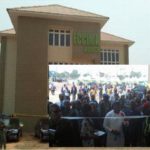|
Getting your Trinity Audio player ready...
|
Governor Ifeanyi Ugwuanyi of Enugu State has stressed the need for peaceful co-existence among communities along boundary areas of Enugu and Anambra states.
Governor Ugwuanyi gave this advice when Enugu and Anambra state delegates met at the Government House, Enugu, to resolve the lingering boundary dispute between Awba Ofe Mmili in Awka North Local Government Area of Anambra State and Ibite Olo in Ezeagu Local Government Area of Enugu State.
The governor who was represented by his deputy, Mrs. Cecilia Ezeilo, stated that both states have a strong socio-cultural affinity and should, as a result,a enjoy an enduring peace, especially at their border areas.
“In approaching this matter of boundary disputes between Enugu and Anambra, we should have at the back of our minds that Enugu and Anambra people are bound together by socio-cultural ties. We have lived together prior to the carving out of both Enugu and the new Anambra states from the old Anambra State in 1991. State creation exercise was not meant to divide, it is rather for administrative conveniences,” the governor noted.
He informed the people of an existing legal boundary instrument with the National Boundary Commission which, according to him, clearly defined the demarcation.
The governor commended the federal government for intervening in the matter in 2006 and 2011, and urged the communities to be law-abiding.
Corroborating Gov. Ugwuanyi’s remark about the historical ties between both states, the deputy governor of Anambra State, Hon. Nkem Okeke, noted that such conflicts would be avoided if the people always remember that human life is ephemeral whereas lands will remain in existence.
Hon. Okeke who represented Gov. Willie Obiano, said: “I know as Igbos we do not play with land; we take land as if our life depends on it, we fight for it with everything we have. But when you die, the land will be there for generations after. The fighting and killings are not worth it.”
He called for a mutually acceptable resolution and charged communities in the dispute to sheathe their swords, adding that government officials responsible for boundary demarcation will soon find a lasting solution to the conflict.
The members later went into a closed session and afterwards issued a communiqué extending the mandate of the security and peace committee charged with the supervision of the planting and harvesting of crops within the disputed area.
It also forbade the people from collecting money from farmers in the area, or to sell the land, and temporarily banned investors from accessing the land. The statement further called for the inclusion of the Divisional Police Officers from the neighbouring communities in both states in the peace committee.



